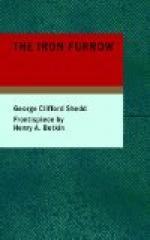The men dropped their tools and confronted him as he drew near.
“This is my land; you keep away,” one exclaimed, with waving arms, while the other backed him up in a show of force.
“How can I build a canal here if you won’t let me go through?” Bryant demanded.
“No go through, no canal on my claim!”
“Well, just let me run a line, anyhow.”
“No. Keep off, keep off,” was the obstinate answer.
The engineer continued to argue, now as if in anger and now with a conciliatory mien, all the while protesting that the homesteader must not prevent the construction of the canal. But he received only shakes of the head, short replies, and malicious looks. So at length, with every pretense of disappointment and dejection, he went down the hillside.
A mile farther along, where he found two more men occupied at similar labour, he likewise dissembled his purpose, with the same opposition, controversy, and retreat. He thereupon led Dave back to the ranch house, where he prepared and ate dinner with satisfaction. Very likely Menocal would receive reports that evening faithfully depicting his chagrin and despair, or whatever were the Mexican equivalents.
Yet while he deluded the banker, he must secretly carry on his actual surveying on the mesa. Since the men setting fence posts had a fairly wide view of the plain, he determined to work in the open only for two or three hours at daybreak before the Mexicans were about. For Menocal, or any one else, must have no suspicion of his real ditch line until an application for construction of the project had been filed in the state engineer’s office.
Signs that the banker had taken measures to keep him under surveillance were not wanting.
“Dave,” he said, “have you noticed a sheepherder with a bunch of sheep hanging around here, when he should be up in the mountains where the range is good?”
“Yes, I’ve seen him. And he hasn’t a full band, either.”
“Looks as if he’s grazing down here on the mesa so as to watch us,” Bryant mused. “When we went north, he and his sheep drifted in that direction; when we were over on the mountain side, they followed there. What shall we do about it?”
“I don’t see that we can do anything except to watch him, too, and fool him.” The lad took thought for a moment, and then proceeded, “Somebody was around here yesterday while we were away, for I saw a brown paper cigarette stub on the ground in front of the door this morning. You use white papers; it’s mostly Mexicans who have those straw papers.”
“Then we had better put an extra nail or two in the windows as a precaution,” Lee stated, “before we go down to Sarita Creek. And I’ll leave Mike here also. If anybody comes fooling around, he’ll take a piece out of the fellow’s leg.”
In addition to nailing the windows and leaving Mike at the door, much to his dissatisfaction, Bryant secreted his papers, note-books, and maps, the theft of which would be an extremely serious loss. Menocal probably would not instigate open lawlessness, but his hirelings might break into the house on their own initiative. And this was not unlikely since a bitter feeling was systematically being aroused against Bryant and his project among the preponderate Mexican inhabitants.




